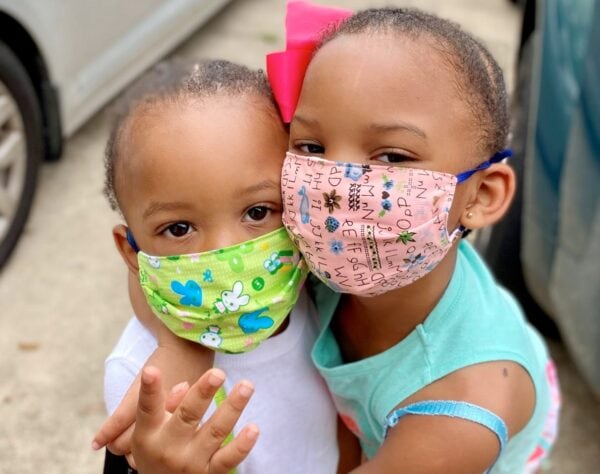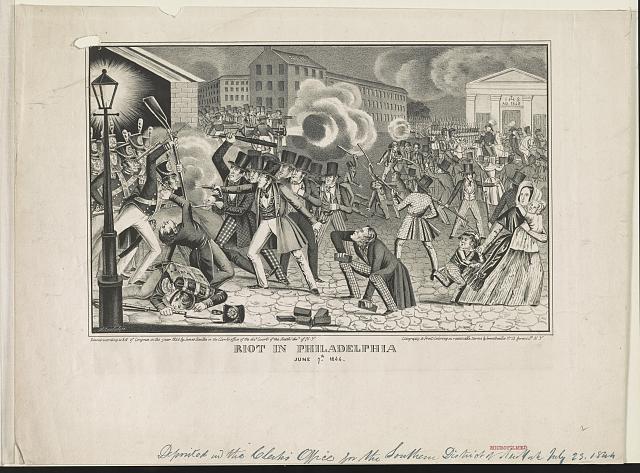The alarm rang at 7:00 a.m. It was the first day of remote learning for my kindergartener. After breakfast, my daughter followed her typical pre-COVID routine that included brushing teeth, getting dressed, and preparing school materials. Instead of driving to the school building, I walked my daughter to her Paw Patrol table and laptop as we waited for her teacher to begin class. Virtual class seemed to be going well as her teacher would provide students with directions. Of course, Mommy was there every step of the way assisting, explaining directions, and controlling the computer’s microphone. Things were going smoothly, until about 9:30 a.m. My three-year-old son unexpectedly (and loudly) entered the room in his underwear exclaiming, “Mommy, Mommy, I’m hungry!” This is going to be a long day, I thought to myself.

Balancing her role as a mom to two small children with work responsibilities was a huge challenge for graduate student .
Balancing her role as a mom to two small children with work responsibilities was a huge challenge for graduate student .
As a wife, mother of two young children ages three and six, and a doctoral student and teaching assistant at Auburn University, I found myself in a confluence of COVID-19 predicaments. When the pandemic hit the United States in March 2020, parents became full-time teachers, teachers transitioned to virtual instruction, and students adjusted to remote learning. Serving in all three roles at once added to the stress. At times, balancing these roles and responsibilities was overwhelming. Yet, despite the trials the pandemic brought, I learned lessons that will continue to influence my life as we head toward a “post-COVID” era.
Time management became more important than ever. One method I regularly relied on was developing a thorough schedule. Before the pandemic, I developed simplistic monthly schedules that only encompassed brief activities and important events. But while working as a student, teaching assistant, mom, and remote kindergarten teacher, I needed a new approach to scheduling. As both my daughter and I were in virtual school, I began to combine our schedules into a comprehensive and detailed agenda, organized by days and hours. It included blocks of work time for class, studying, reading, writing, and homework. Other sections designated time for meals, movies, workouts, and bedtimes. Planning workouts and bedtimes (for both me and my kids) helped me to maintain my physical and mental health, as it helped me feel refreshed and energized for the next day.
Time management became more important than ever.
Another essential tool was my daily to-do list. This method not only helped me complete tasks, from folding clothes to grading student assignments, but checking off completed tasks provided me with a lot of satisfaction in a chaotic and distressing time. For instance, if I completed tasks earlier than expected, I would use the resulting “free time” to unwind, spend time with family, or get a head start on another task. The free time I found with this system allowed me to begin writing assignments weeks in advance, complete class readings days prior, and meet deadlines for grading students’ work.
The pandemic also provided me with awareness about myself as a parent, wife, student, and teacher that I did not fully realize before. My children would ask questions such as, “Why is school closed? Why does COVID make you sick? Sanitizer or soap?” The pandemic allowed me to teach my children about health and wellness, such as the importance of handwashing and healthy lifestyle choices. These long months also made me more appreciative of children’s social gatherings, playdates, and recreational activities. I realized the importance of their social interactions, and now I am more inspired to enroll them in extracurricular activities. As a wife, the pandemic reminded me of the importance of date nights and quality time outside of the walls of our home and away from our children. Thus, I look forward to outings and vacationing with my spouse in a post-pandemic world as it will provide us with time to de-stress and further encourage communication and togetherness.
As a student, I learned the importance of community and networking as I was able to speak with my professors about assignments, but also we had open conversations about the difficulties of managing life during COVID. The pandemic year led me to network with graduate students within and outside of my institution for academic and emotional support, a tool that I will continue to foster. As a teacher, I grasped the importance of flexibility; sometimes big life events intervene or technical issues happen, and that is okay. This altered my approach to students’ personal issues. My students too had lives outside of the classroom and were juggling multiple roles. Thus, the pandemic taught me to be empathetic to student circumstances, become more flexible, and not take time, relationships, health, and life for granted.
I grasped the importance of flexibility; sometimes big life events intervene or technical issues happen, and that is okay.
Though I gained valuable lessons and life skills, the year-long isolation had unwanted effects. There were some lessons that I did not master, such as witnessing the deaths of loved ones and world citizens to COVID. A lack of in-person communication made these events even more difficult. Despite cell phones and other ways of virtual communication, this way of connecting was not comparable to in-person interactions. My family and I longed to visit and hug family and friends. Additionally, the pandemic caused many parents (myself included) to have difficult conversations with their children about sickness and death. Being a stay-at-home mom to young children was exhausting, and maintaining social distancing left limited outlets for escape. As we look toward a post-pandemic era, I look forward to recuperating social outings and activities with family and friends. I am also eager to walk on my university’s campus, greet students, converse with my professors, and meet face-to-face with colleagues.
Understanding the effects this pandemic had on me will be a long and complex process. The past year showed me that I can manage multiple roles simultaneously while taking care of my mental and physical health. As a wife and parent, I gained time management skills and tons of memories—not all of them happy; as a student, I found a supportive community of empathetic academics; and as a teacher, I learned the importance of flexibility and empathy. Although COVID resulted in unforeseen obstacles, it also led to invaluable experiences that will change how I parent and work for a long time to come.
Mickell J. Carter is a history PhD student at Auburn University. She tweets @MickellCarter.
This work is licensed under a Creative Commons Attribution-NonCommercial-NoDerivatives 4.0 International License. Attribution must provide author name, article title, Perspectives on History, date of publication, and a link to this page. This license applies only to the article, not to text or images used here by permission.


